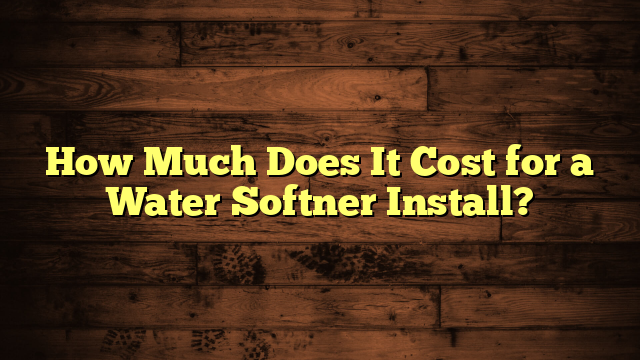How Much Does It Cost for a Water Softner Install?
Like a well-tuned orchestra, the cost of a water softener installation can vary greatly based on the components involved. You might find yourself wondering if the investment is worth it when faced with price ranges from $400 to $4,000. Factors such as system type, installation complexity, and local labor rates can easily complicate the picture. But before you make any decisions, it's important to take into account not just the initial costs but also the long-term implications for your home and budget. What else should you know?
Key Takeaways
- Average purchase prices for water softeners range from $400 to $4,000 depending on type and brand reputation.
- Installation costs can increase due to plumbing complexity, location, and local labor rates.
- DIY installation may save money but risks costly repairs if not done correctly.
- Ongoing maintenance includes regular salt refills, filter changes, and potential service calls, impacting long-term costs.
- Long-term savings arise from reduced appliance maintenance and lower utility bills due to improved energy efficiency.
Understanding Water Softener Types
When evaluating a water softener, it's vital to understand the different types available. You'll often come across salt-based systems, which are the most common option. These systems work by exchanging sodium ions for calcium and magnesium ions, effectively reducing hardness in your water.
They're known for their efficiency and effectiveness but do require regular maintenance, including salt replenishment.
However, if you're looking for alternative solutions, there are several options to explore. Salt-free systems, for instance, don't actually soften the water but instead use a process called templating to prevent scale buildup.
These systems can be a great choice if you're concerned about sodium intake or environmental impact.
Another alternative is reverse osmosis systems, which filter water and remove various contaminants, including hard minerals.
While they can be more expensive, they provide high-quality water for drinking and cooking.
Each type of water softener has its pros and cons, so it's important to reflect on your needs, budget, and the specific water quality issues you're facing.
Understanding these options can help you make an informed decision that suits your lifestyle.
Factors Influencing Installation Costs
Several factors can greatly influence the installation costs of a water softener, so it's essential to take these into account before making a decision.
First, your installation location plays a significant role. If you're in a tight space or need extra plumbing work, expect higher labor costs. Similarly, the complexity of your home's plumbing system can affect the time and resources required for installation.
Next, consider the water quality in your area. If you have particularly hard water, you may need a more advanced system, which can lead to increased installation expenses. Furthermore, if your water has high levels of iron or other contaminants, pre-treatment options might be necessary, further driving up costs.
Local labor rates also vary, so it's wise to get multiple quotes from professionals in your area.
Finally, some homeowners may opt for DIY installation to save money, but remember that improper installation can lead to costly repairs down the line.
Average Purchase Prices
On average, homeowners can expect to spend between $400 and $4,000 on purchasing a water softener. This broad range reflects various factors like brand, type, and capacity. For instance, you'll likely find basic models at the lower end of the spectrum, while high-end systems with advanced features can easily reach the upper limits of the average price ranges.
When you're making a cost comparison, consider whether you want a salt-based or salt-free system, as this can impact your budget considerably. Salt-based models tend to be more effective in hard water treatment but often come with higher purchase prices. Alternatively, salt-free systems might have lower upfront costs, but they may not be as effective in all scenarios.
Additionally, keep in mind that while the initial purchase price is essential, the long-term maintenance and operational costs also play a role in your total investment. By understanding the average price ranges and making informed choices, you can better navigate your options and select a water softener that fits your needs and budget.
Installation Fees Breakdown
When you're considering the installation of a water softener, it's important to understand the various fees involved.
Labor costs can vary greatly based on your location and the complexity of the installation, while equipment pricing factors in brand, capacity, and additional features.
Labor Costs Overview
Labor costs for water softener installation can vary greatly based on several factors, including the complexity of the job and the region where you live.
You'll find that labor wage fluctuations can meaningfully impact the overall cost. For instance, if you're in a high-demand area, expect to pay more for skilled technicians.
When considering installation timeframes, remember that more complicated systems may take longer to install, thereby increasing labor costs.
Here are a few components that affect labor pricing:
- Accessibility: If the installation site is tricky to reach, it can inflate labor charges.
- System Type: More advanced softeners typically require specialized skills, which can lead to higher fees.
- Local Rates: Different regions have varying standard labor rates, affecting your total cost.
Equipment Pricing Factors
Understanding how equipment pricing factors into your water softener installation can help you budget effectively. The price of your water softener largely depends on the brand comparison and the specific features each brand offers. High-end brands often come with advanced technology and warranties, which can increase the initial cost. However, these brands might save you money in maintenance and durability over time.
Capacity considerations also play an essential role in pricing. If you have a larger household, you'll likely need a unit with higher capacity, which generally costs more. Smaller units are less expensive but may not meet your household's needs, leading to inefficiencies and potential replacements down the line.
Additionally, don't forget to factor in installation fees, which can vary based on your location and the complexity of the installation. Some retailers offer package deals that include installation, which could save you some cash.
Ongoing Maintenance Expenses
Ongoing maintenance expenses for your water softener can considerably impact your overall budget. Staying on top of these costs is vital, as they guarantee your system runs efficiently and lasts longer.
You'll need to factor in both routine checks and supplies to keep everything in good shape.
Here are some common ongoing maintenance expenses to take into account:
- Salt Refills: Regularly adding salt to your brine tank is essential, and the cost can add up over time.
- Filter Changes: Depending on your system, replacing or cleaning filters periodically can help maintain water quality and protect your appliance.
- Service Calls: If you encounter issues, professional inspections or repairs can be necessary, and these costs can vary widely.
DIY vs. Professional Installation
When deciding between DIY and professional installation for your water softener, it's essential to weigh your options carefully. Tackling a water softener installation yourself can be tempting, especially if you're handy around the house.
However, there are several DIY challenges you might encounter. Plumbing complexities, proper equipment handling, and guaranteeing ideal placement can be tricky. If you're not familiar with these aspects, it could lead to mistakes that may negate any savings you hoped to achieve.
On the other hand, opting for professional installation comes with various benefits. Professionals have the experience and knowledge to handle the installation efficiently and correctly.
They can quickly assess your home's plumbing system, making sure everything meets local codes and functions seamlessly. Moreover, many professionals offer warranties on their work, giving you peace of mind that you won't face unexpected issues soon after the installation.
Ultimately, the choice boils down to your comfort level with DIY projects versus the value you place on professional expertise. If you're unsure, it might be worth investing in a professional to avoid future headaches and guarantee your water softener operates effectively.
Potential Additional Costs
Installing a water softener often comes with potential additional costs that can catch you off guard.
Beyond the initial price of the unit and standard installation, you might face extra expenses that can add up quickly. Being aware of these costs can help you budget effectively.
- Additional features: If you want advanced options like a dual-tank system or smart technology, expect to pay more.
- Installation permits: Depending on where you live, you might need permits for the installation. These can vary in cost and are essential to guarantee everything's up to code.
- Maintenance supplies: Don't forget about ongoing costs for salt or potassium chloride and any necessary maintenance supplies.
Long-term Savings Overview
When you invest in a water softener, you're not just paying for installation; you're also setting yourself up for long-term savings.
Over time, you'll likely notice reduced appliance maintenance costs, lower utility bills, and an extended lifespan for your plumbing.
These benefits can greatly offset the initial expense, making it a smart choice for your home.
Reduced Appliance Maintenance Costs
Reducing hardness in your water not only improves its taste but also greatly cuts down on appliance maintenance costs over time.
When you soften your water, you'll notice a significant boost in appliance longevity, as well as a decrease in maintenance frequency. This means fewer repairs and replacements, saving you money in the long run.
Here are some key benefits you'll experience:
- Fewer mineral build-ups in your dishwasher and washing machine, leading to cleaner dishes and laundry.
- Extended lifespan for water heaters, as softened water helps them operate more efficiently.
- Less frequent repairs for faucets and showerheads, keeping them functional and visually appealing.
Lower Utility Bills
Lower utility bills become a reality once you install a water softener in your home. With softened water, you'll notice a significant reduction in water usage and improved energy efficiency. By removing hard minerals, your appliances work more effectively and consume less energy, leading to lower bills over time.
Here's a quick comparison of potential savings:
| Item | Before Water Softener | After Water Softener | Savings |
|---|---|---|---|
| Water Heater Usage | 80 gallons/month | 60 gallons/month | $10/month |
| Laundry Costs | $15/month | $10/month | $5/month |
| Dishwasher Costs | $10/month | $7/month | $3/month |
| Total Monthly Savings | $18/month |
These savings add up, making a water softener a smart long-term investment. You'll not only enjoy softer water but also see a decrease in your monthly expenses. So, if you're looking to cut costs while enhancing home comfort, consider how a water softener can lead you to lower utility bills. It's a win-win for your wallet and your home!
Extended Plumbing Lifespan
While many homeowners focus on immediate savings, the long-term benefits of installing a water softener extend to your plumbing system as well. When you soften your water, you enhance plumbing efficiency and greatly contribute to an extended lifespan for your pipes and fixtures.
Hard water can cause mineral buildup, leading to clogs and leaks over time. By reducing this buildup, you not only protect your plumbing but also save money on repairs.
Imagine the peace of mind that comes with:
- Fewer plumbing repairs: Say goodbye to costly emergency calls and frequent maintenance.
- Longer-lasting appliances: Your dishwasher and water heater will thank you for the softer water.
- Better water flow: Enjoy improved pressure and performance in your home's plumbing.
Investing in a water softener pays off in the long run. With reduced wear and tear on your plumbing system, you're likely to extend the lifespan of your pipes and fixtures.
This means fewer interruptions in your daily life and the comfort of knowing your home is in good shape. Ultimately, this investment not only protects your plumbing but also contributes to the overall efficiency and longevity of your home.
Frequently Asked Questions
How Long Does a Water Softener Installation Typically Take?
The installation timeline for a water softener usually takes about two to four hours. During the installation process, you'll see the technician connect the system, test it, and explain its operation to you.
Can I Install a Water Softener Myself?
You can definitely tackle a DIY installation of a water softener yourself. Just make sure you have the right installation tools and follow the instructions carefully for a successful setup without professional help.
What Are Signs I Need a Water Softener?
If you notice hard water indicators like scale buildup on faucets, dull laundry, or dry skin, it's time to contemplate a water softener. You'll enjoy the benefits of softening, including cleaner appliances and smoother skin.
Will a Water Softener Affect My Water Pressure?
You know what they say, "A chain is only as strong as its weakest link." A water softener can slightly reduce water pressure, but most installations have minimal effects, keeping your flow strong and consistent.
Do Water Softeners Require Electricity to Operate?
Yes, some water softener types require electricity to operate, particularly those with advanced features. However, many models are energy efficient and consume minimal power, ensuring your utility bills remain manageable while enjoying softened water benefits.
Conclusion
In conclusion, installing a water softener involves several significant costs, from the initial purchase to ongoing maintenance. By understanding the types of systems available and the factors influencing your investment, you can make a smart, savvy choice. Don't forget to weigh DIY versus professional installation, as it can save you some serious cash. With proper planning, you can enjoy the benefits of softened water without breaking the bank, ensuring a smoother, simpler, and sweeter home experience.







